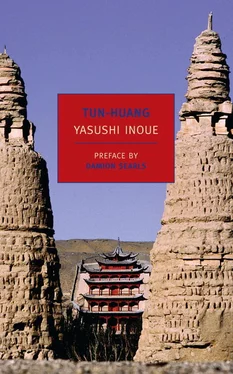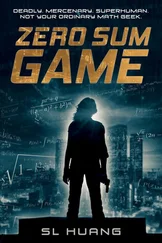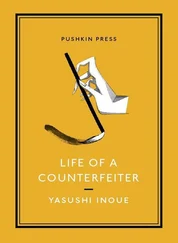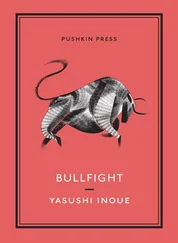“All right, I’ll be there by dusk tomorrow.”
“Don’t forget the necklace,” Kuang reminded him once more.
After Hsing-te had left Kuang, he walked around the city of Sha-chou, soon destined to be razed. He was not in the mood to return to his quarters.
All the streets were in confusion with residents attempting to flee. Camels and horses passed by. Sha-chou was different from any other walled town Hsing-te had seen in the western regions. Its streets were wide and lined with shade trees, and old, imposing shops now thronged with people. He left the shopping area and walked to the residential section, with its rows of large houses enclosed by mud walls. Confusion reigned here, too. The streets were a total chaos, but there was a sober quality to the uproar. Now and then the noise would subside, and an oppressive silence would prevail for a while. The moon had come out. It was blood-red.
Hsing-te went to the temple section of town. Here the temples were much larger than those in which Wang-li’s troops were billeted in the eastern part of the town. In the spacious temple grounds were large, regular-shaped monasteries standing in rows. As might be expected, only this section of the town was calm. Most probably evacuation preparations were taking place inside, but the sounds did not reach the streets.
Hsing-te passed several temples. He did not know the names of any of these, but he entered the grounds of the temple with the largest monastery. Just past the gate was a large pagoda on the right. The crimson moon hung on the shoulder of the tower. The pagoda and several buildings cast dark shadows in the dim grounds. Hsing-te stepped into these black shadows and walked further into the precincts. He soon came upon a lighted building. As the area was so still, he had thought it empty, and was surprised.
Hsing-te walked toward the light. As he walked up the low steps, he judged the building to be a repository for sacred scriptures. The front door was slightly ajar. There were several lights in the room; it was much brighter than he had thought.
As he peered into the room, he saw an enormous number of Buddhist scrolls and papers spread over the whole area. In the midst of them were three young priests who at a glance appeared to be about twenty years of age. Of the three youths, two were standing, the other was crouched over. They were so absorbed in their work that they did not even notice Hsing-te looking in.
At first Hsing-te could not make out what they were doing, but as he watched he realized that they were sorting out the religious works. At times they would hold and look over a particular work at length, while at other times they would put it down quickly to pick another one up. Hsing-te was fascinated as he watched the three men, and after a bit he spoke to them: “Tell me, what are you doing?”
The three young priests, startled, looked simultaneously toward Hsing-te.
“Who are you?” one of them shouted.
“I’m no one to be afraid of. What in the world are you up to?” Hsing-te said, as he stepped into the room.
“We’re sorting our sacred scrolls,” the same priest replied.
“What do you plan to do with them after you’ve sorted them?”
“We’re just preparing for an emergency. If the temple should catch fire, we’ll escape with the selected ones.”
“You’re going to wait until it catches fire?”
“Naturally!”
“Aren’t you evacuating? You know that evacuation orders are out, don’t you?”
“Even if such orders have been given, do you think that we could run off and leave all these sacred scrolls behind? We don’t know about anyone else, but we plan to remain here even after the fighting starts.”
“Where are the other priests?”
“They’ve left. But they do not concern us. We have chosen to do this.”
“Where is the chief abbot?”
“He’s been at the palace since last night to discuss what to do about the temple.”
“Why can’t you evacuate and leave everything behind?”
At this, the young priests expressed contempt. The youngest priest, who had remained silent until then, spoke up. “The number of sacred writings we’ve read is not worth mentioning. There is an enormous amount that we have not yet read. There are countless scrolls that we have not even opened. We want to read them.”
Those words suddenly struck a sympathetic chord in Hsing-te’s heart. For a moment he felt drained of energy. He recalled how he, too, had often uttered these very words many years before.
Hsing-te immediately left the repository. He must see Yen-hui as soon as possible. He walked the long distance from the temple to Hsien-shun’s palace. The streets were in as much chaos as before. On his way, Hsing-te ran across countless groups of evacuees; each time he had to step aside to let them pass.
When Hsing-te arrived at the palace, he requested an interview with Yen-hui through a guard. After a short wait, he was led through a maze of halls and finally into an inner chamber.
In the center of the large room, Yen-hui sat deeply sunk in a chair, just as in his own Kua-chou palace. But this room was infinitely more luxurious and beautiful than Yen-hui’s, which by now was probably burned down. All the furnishings and the rugs were opulent, and the candlesticks lighting the room were magnificent.
“What’s the matter?” Yen-hui had not actually spoken, but he raised his listless eyes toward Hsing-te as though he had just asked that question. Hsing-te asked what the ruler, Hsien-shun, was doing now.
“Nothing, really, He’s so absorbed in battle preparations that he won’t listen to anything else.” Yen-hui spoke despairingly.
“What will happen to the temples?” Hsing-te inquired.
“They’ll just burn.”
“And the priests?”
“I hear that most of them have left.”
“What about the sacred scriptures?”
“They’ll be reduced to ashes.”
“And you’ll let this happen?”
“It can’t be helped, can it? Hsien-shun shows absolutely no concern for such things.”
“Then why don’t you personally give out some orders?”
“Even if I should, it will make no difference. The chief abbots of seventeen temples are gathered in conference in the inner chamber. They’ve been discussing the problem since last night, but all they do is talk and they can’t come to any decision.”
Yen-hui left his seat and started to pace slowly about the room. Then in a low voice, as if muttering to himself, he spoke. “Actually, it’s natural they cannot come to a decision, no matter how long they discuss it. The number of scrolls in the repositories of the seventeen temples is vast. It would need days just to take them out. More days would be necessary to pack and load them on camels. And where could they take the thousands of camels loaded with scrolls? To the east? west? south? Or north? Where can you find safety?”
After he had finished speaking, Yen-hui returned to his seat. “Kua-chou was burned down. Sha-chou, too, will probably be destroyed in the same way. The city will burn. The temples will burn. And the sutras will perish in the flames.”
Hsing-te stood upright in a corner of the room. It was true that the sacred scrolls were countless. In this time of crisis, it seemed there was nothing they could do to save them.
He, in his turn, started pacing about the room. He thought with infinite compassion of the three young priests who were at this moment wrestling with the innumerable scriptures in the repository.
Even after Hsing-te had left Yen-hui and returned to his quarters, he could not forget the sight of the three young monks sorting out the sacred books. As Yen-hui had said, Sha-chou would soon be burned down. The temples, the treasures, the scriptures — everything — would be enveloped in flames, and the fate of Kua-chou would befall Sha-chou. There was nothing anyone could do about it now.
Читать дальше












